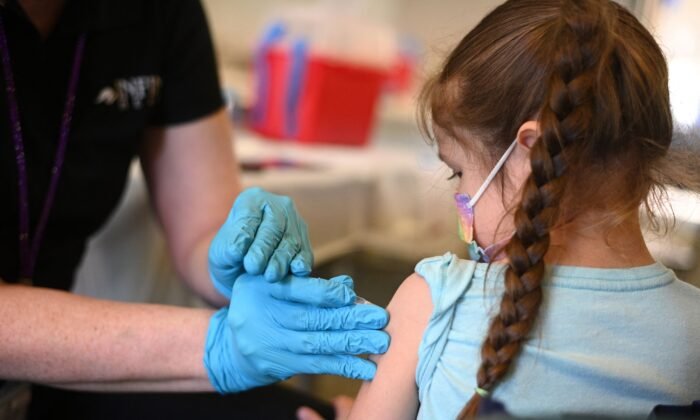Study Finds Children Vaccinated in Messenger RNA COVID-19 Trials at Increased Risk of Specific Illnesses
Study analyzed data from clinical trials.
Children who received a Moderna or Pfizer COVID-19 vaccination in clinical trials were at increased risk of certain illnesses, according to a new study.
Compared to placebo recipients, children who received one of the modified messenger ribonucleic acid (mRNA) shots were at an increased risk for serious adverse events or respiratory tract infections, Dr. Christine Stabell Benn and other researchers found.
Dr. Benn led a group in analyzing data from phase 3 trials conducted for the mRNA vaccines in children, or people younger than 18.
The group was focused on figuring out whether the vaccines could have unintended effects beyond COVID-19.
They examined trial data from regulatory websites and other sources, ending up with six studies that covered 25,549 people, about 68 percent of whom received a vaccine. The rest received a placebo.
Moderna and Pfizer trials divided children into slightly different age groups. Moderna often grouped kids 6 months to 11 years of age, while Pfizer did so for children aged 5 months to 11. The researchers looked at outcomes across all children, and also after stratifying children by young, younger, and oldest.
The risk of serious adverse events, or events leading to death or hospitalization, was worse for younger and oldest recipients, but not for the youngest. The 12- to 17-year-olds also faced an increased risk of severe adverse events, or events deemed medically significant but not immediately life-threatening. That higher risk was not statistically significant in the younger group, and the risk was lower in the youngest group.
The youngest children, however, faced a higher risk of respiratory tract infections such as bronchitis and respiratory syncytial virus. Respiratory tract infections were not counted in the trials of younger and oldest children.
The researchers also found that vaccinated children were also at higher risk of skin and tissue disorders.
The analysis did have a favorable conclusion when it came to preventing COVID-19 itself. The vaccines decreased the risk of infection, although when stratified by age the decreased risk was only statistically significant for children aged 2 to 5 who received a Moderna vaccine.
“The most important finding is that when we compile the data from the phase 3 trials, some clear signals emerge—the vaccines reduced the risk of COVID-19, but they at the same time increased the risk of severe adverse events, particularly in the older children who also received the highest vaccine doses, and they increased the risk of lower respiratory tract infections in the younger children for whom this information was collected,” Dr. Benn told The Epoch Times in an email.
Ehud Qimron, professor of clinical microbiology and immunology at Tel Aviv University, said the new paper “underscores potential safety concerns surrounding mRNA [COVID-19] vaccines.”
“This study’s findings warrant serious consideration and demand immediate scrutiny,” Mr. Qimron, who was not involved in the research, told The Epoch Times in an email.
Risk-Benefit Estimate
Authorities in the United States and some other places have estimated the COVID-19 vaccines provide more benefit than risk, including for children. But researchers in the new study said that it would take 37 to 103 children receiving a shot in order to provide a benefit.
In light of the higher risk of problems, “neither of the mRNA vaccines had a beneficial effect on overall health,” they wrote, calling for “a renewed assessment of the value of COVID-19 vaccination of children and adolescents.”
The study was funded by the Bluebell Foundation. Authors declared no conflicts of interest.
Limitations include the trials not including many children, especially when compared to those featuring adults, and difficulty comparing adverse events across trials due to “inconsistencies in the reported number of events between the main texts, supplementary data, and trial reports,” the researchers said.
Ideally, fresh randomized, controlled trials (RCTs) would be conducted, but “I would honestly not find it justified to vaccinate children with COVID-19 vaccines,” Dr. Benn said.
She is working on further research in the area.
“It is difficult to study the overall and non-specific effects, once a vaccine is recommended, because comparing vaccinated and unvaccinated is a bit like comparing apples and bananas, they can differ in many other ways than just the receipt of vaccine,” Dr. Benn said. “But we are currently undertaking such studies in children in Denmark, because COVID-19 vaccines were only recommended to Danish children for a short period, and many parents never accepted the vaccine, so we have around 5,050 who did or did not receive vaccine, and we are able to control for a large range of possible confounders, so we think we can get some pretty reliable effect estimates.”




